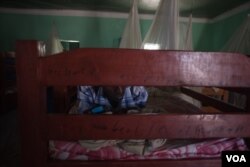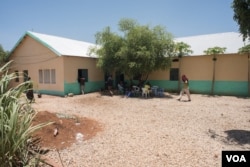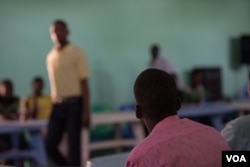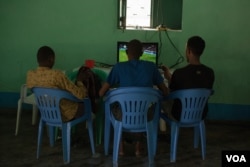Young men play football in the afternoon sun. It is a common scene in Somalia, except for the razor wire and guard towers that surround this compound in the town of Baidoa.
The players are all former members of the al-Qaida affiliate in Somalia, al-Shabab, which formed a decade ago and has fought a bloody insurgency against the country's government.
The men left al-Shabab and were chosen for this U.N.-backed rehabilitation program instead of jail.
“An explosion happens and you don’t like it, [the] mass killing of people. When they fight between them - the al-Shabab leaders - you keep on collecting all these incidents, then finally they will do something which will immediately change your mind,” said Abdi (not his real name), a rehab participant.
For him, the breaking point was when al-Shabab leaders banned members from opening small businesses. He was just a teenager when he joined, after his father was killed by Ethiopian troops fighting the militant group in Somalia.
"I have lost six years," he said. "The people who I was with in high school, they are in university, they are in the town, and if you see them, they are hopeful. Before I get to 30, I hope to catch up with them."
Typical day
During a typical day, former combatants take literacy, life skills, and religion classes. They develop business plans funded by the center to support themselves after graduation. The goal is to reintegrate them into society.
But their past is never far away. Abdi continues to receive threatening phone calls from al-Shabab.
"Absolutely I cannot go to where al-Shabab are, and if I go into the town, the community might not feel safe, so the best thing is just to stay here at the center, and just to accept the situation until time goes by and the community becomes more enlightened about who we are," he said.
Of the 160 men currently enrolled, about 40 stay full-time at dormitories in the center, while the others live with families in town.
At the center, the men cook meals and eat together, and relax by playing sports, card games, and watching television.
Once an extremist always extremist?
The rehabilitation process takes time, as some former fighters maintain extremist beliefs.
"We will say to them, 'Okay, if you believe in this, and we believe in that, let's sit down with the Holy Koran and the Hadith, and you do your research, and if your interpretation is correct we go with this, if mine is correct we go with that.' Because we are Muslims, we have to debate in a constructive way," said an Islamic teacher at the center, who asked VOA not to use his name for safety reasons.
No relapses
So far, no graduates from Baidoa have rejoined al-Shabab, according to the center's managers, but the process is far from perfect.
For one, it is relatively small. Hundreds of fighters have defected from al-Shabab since 2013, but the terror group counts as many as 10,000 fighters by some estimates. Al-Shabab has continued to recruit and carry out deadly attacks in Somalia and neighboring Kenya.
There's also confusion over how defectors are selected for rehab versus jail. And local residents ask why former terrorists get all this support and they don't.
Men only
The center in Baidoa only takes men. Some of the men there told VOA they have married friends who would also like to leave al-Shabab, but they don’t want to leave their wives and children behind.
But Patrick Loots, who designed the program as head of the U.N.'s demobilization, disarmament and reintegration program in Somalia, says the rehabilitation center remains vital.
"This has created some kind of reassurance to some groups in al-Shabab to start reaching out to the current government and say let's talk a peace deal, and they have directly connected to this program, so this is much bigger than we think, and I believe that even though it's a drop in the ocean, it’s a drop in the ocean with the right people,” he said.
















